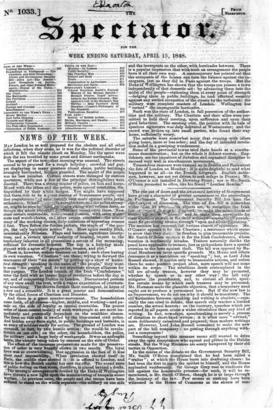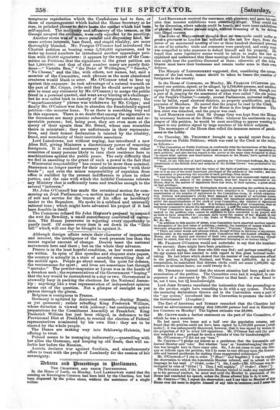The stir out of doors and the.awakened activity of Government
have given a character of greater earnestness to the proceedings in Parliament. The Government Security Bill has been the chief subject of discussiep,. The title .of the bill is somewhat 15 ;der *Ian its seoN‘..4.-4,7* objects are, to assimilate the Irish ,tav • 'A.-mai:it the unosav,szinds of trealio•- 4,4apir"vgftslony!'' and to male: nea answimble for tsaeiftlieeenoiri4rell as ter Osei.-f writingsmeriable I punish- ment for proulOting treason, through "open and adviiefreaking." The measure has encountt iod various classes of nicronarits. Mr. O'Connor opposes it for the Chartists ; a resistance which seems to avow that they desi: he freedom to plan treasonable projects. Mr. Smith O'Brien oprio.,e.s it for the Irish Confederates, whose vocation it confessedly invades. Traitors naturally dislike the penal laws applicable to treason, just as pickpockets have a special aversion to the laws against theft. The bill was opposed by Ra- dical Members on more specific grounds. Mr. Hume and others denounce it as a restriction on 4 speaking " • but, as Lord John Russell showed, it applies only to treasonable actions, and unless there be some positive project afoot, mere speech -will not come within its scope. The rebellious deeds contemplated in the bill are already treason, however they may be promoted, whether by speech or in any other way : the bill only mitigates the punishment, and, to obviate all doubt, speci- fies certain means by which such treasons may be promoted. Mr. Horsman made the plausible'objection, that a temporary need oi.c.ht not to produce a permanent law. But if the new law is an stnprovement, we do not see why it should be transitory. The old between speaking and writing is obsolete,—espe- cially the one cited in debate, that speech only teaches a limited number, the actual hearers: on the contrary, speeches which are reported in all papers attain a wider circulation than any kind of writing. In fact, nowadays, speechmalcingis merely a process of dictation to short-hand writers ; it is often more " advised," more deliberately calculated and prepared; -than modern writings are. However, Lord John Russell consented to make the new part of the bill temporary : no getting through anything withs out a compromise !
Something beyond this measure seems still wanted to drive away the open conspirators who squeak and gibber in the Dublin streets. But the Whig Ministers are sorely hampered by their old tactics in Opposition.
In the course of the debate on the Government Security Bill, Mr. Smith O'Brien complained that he had been called a " traitor "; at which the House burst into deafening cheers: he had been the first to apply the epithet to himself, and the House applauded vociferously. Sir George Grey rose to vindicate the bill against the honourable prisoner—for such, it will be re- membered, is Mr. Smith O'Brien, though he is at large through the leniency of the law. Few scenes so striking have been witnessed in the House of Commons as the shouts of con- temptuous reprobation which the Confederate had to face, or those of encouragement which hailed the Home Secretary as he rose, in polished phrase to drive home the epithet which had been self-applied. The malignity and effrontery of the treason, as Sir George arrayed the evidence, were only equalled by its puerility. Another scene was of a more painful and disgusting kind, be- cause serious interests, base fraud, and stupid ribaldry, are more thoroughly blended. Mr. Feargus O'Connor had introduced the Chartist petition as bearing some 5,700,000 signatures, and to
i
make up round numbers he introduced another appendage peti- tion with 30,000 signatures : it appears by the report of the Com- mittee on Petitions that the signatures to the great petition are but 1,900,000; and that of that number many are purely ficti- tious—" Victoria Rex," "the Duke of Wellington," " Snooks," "No Cheese," and the like, with others, not names, but, said a member of the Committee, such phrases as the most abandoned creatures would blush to utter. Mr. O'Connor tried to bear up against this exposure: he took advantage of a natural warmth on the part of Mr. Cripps, (who said that he should never again be able to trust any statement by Mr. O'Connor,) to merge the public fraud in a personal quarrel, and went away hinting at 'a challenge: but he was called back in custody of the Sergeant-at-Arms ; the " =parliamentary " phrase was withdrawn by Mr. Cripps; and finally Mr. O'Connor was fain to abandon the fraudulently signed petition—the monster hoax. To us there is something very sad in this exposure. There is no doubt that among the signatures to the document are many genuine subscriptions of earnest and re- spectable persons; but, being poor, they are even more at the mercy of their agents than Mr. Strut; whose case resembles theirs in miniature ; they are unfortunate in their representa- tives, and their honest declaration is tainted by the ribaldry, fraud, and mendacity of their inevitable associates.
Lord Lansdowne, not without urging, has introduced a new Alien Bill, giving Ministers a discretionary power of removing foreigners. It is rendered necessary by the influx from other countries of many persons likely to turn their residence here to machinations against the public peace. The only difficulty that we feel in assenting to the grant of such a power is the fact that " Ministerial responsibility" has ceased to be more than nominal. Statesmen no longer answer for their administration "with their heads "; and even the minor responsibility of expulsion from office is nullified by the present indifference to place in other parties, and the ease with which the faithful Commons tolerate any Ministry that is sufficiently tame and truckles enough to the several " interests."
Mr. John O'Connell has made the occasional motion for sum- moning an Irish Parliament,—a motion made pro forma, by way of suit and service for the tenure of his office as hereditary leader to the Repeaters. He spoke in a subdued and unusually rational tone ; which might have advanced his project if it had been feasible in itself.
The Commons refused Sir John Harmer's proposal to, suspend the writ for Bewdley, a small constitbency convicted or corrup- tion. The House perseveres in 'rejecting every opportunity to purify itself. Of course every item is set down in the "little bill" which will one day be brought in against it.



























 Previous page
Previous page